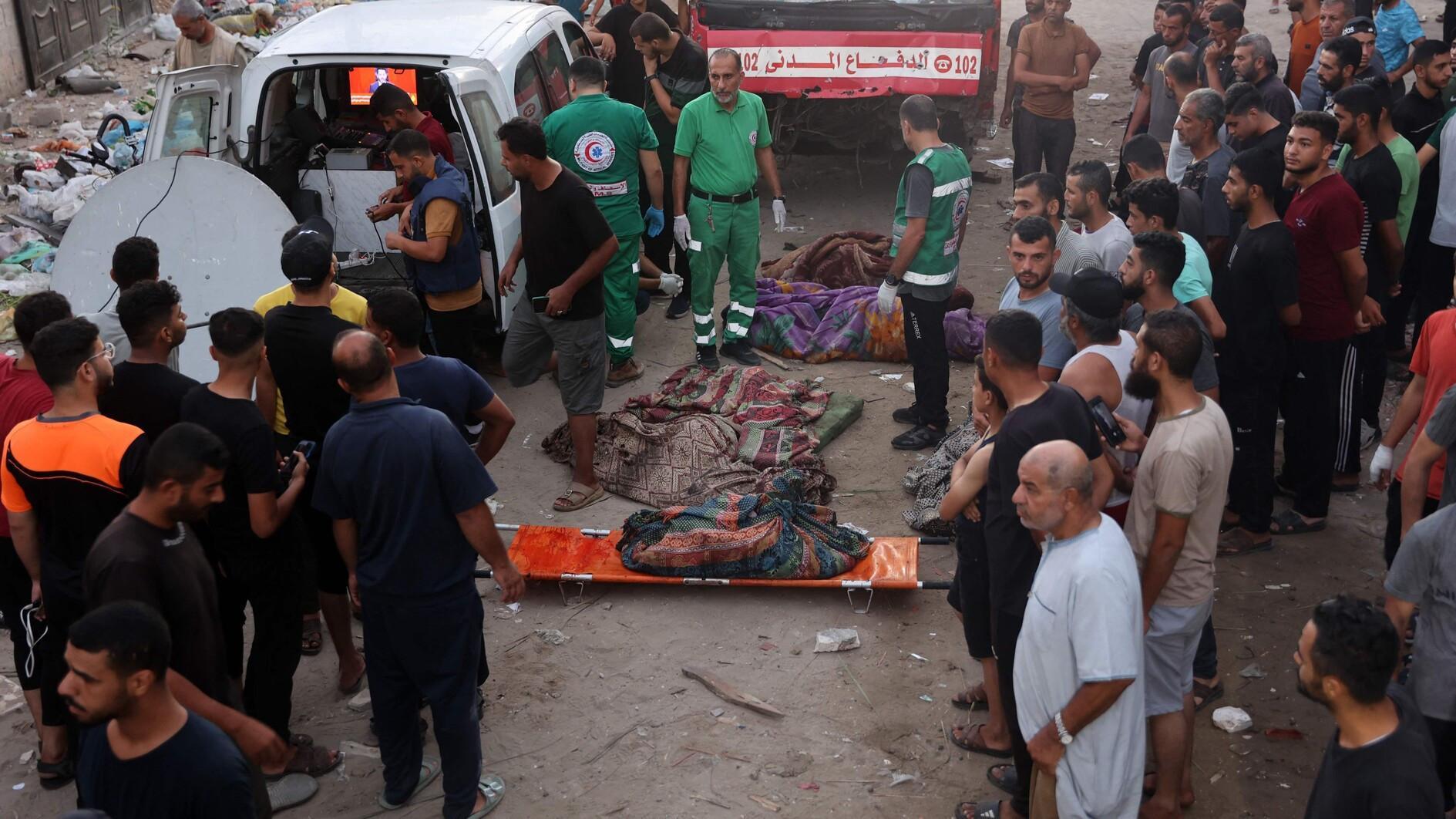
TOPSHOT - Displaced Palestinians watch as first responders prepare to transport corpses of people killed in an Israeli strike on a school in Gaza City on August 10, 2024, that killed more than 100 people.
Israeli airstrikes on a school in Gaza that was housing displaced people resulted in the deaths of more than 100 Palestinians, as Israel continues its months-long aggression on the besieged territory.
The Islamic Jihad Palestinian military group said that the strike took place "during the dawn prayer".
Ismail Al-Thawabta, director general of the Gaza government media office, told AFP that the strike "resulted in more than 100 martyrs and dozens of injuries, most of which are in severe and critical condition".
The Israeli military said it struck a Hamas "command and control centre" that was "embedded" in Al-Tabi'een school in the Daraj neighbourhood.
"Numerous steps were taken to mitigate the risk of harming civilians, including the use of precise munitions, aerial surveillance, and intelligence information," a statement said.
Gaza government media sources said the school was housing about 250 women and children, about half of them women and children.
The strike comes two days after Gazan authorities said more than 18 people were killed in Israeli strikes on two other schools in Gaza City, with the military saying at the time it had struck Hamas command centres.
Israel has vowed to destroy the Palestinian group in retaliation for its Oct. 7 attack, but agreed to resume talks next week at the request of international mediators following intense diplomacy aimed at averting a region-wide conflagration.
Iran has claimed that Israel wants to spread war in the Middle East, and Hamas officials, some analysts and critics in Israel have said Netanyahu has prolonged the fighting for political gain.
During 10 months of war across the Gaza Strip, the military has found itself returning to some areas to fight the militants again.
"Enough!" shouted Khan Yunis resident Ahmed al-Najjar.
"Have mercy on us, for God's sake, the young children and women are dying in the streets. Enough!"
Israel's military said Friday that troops were operating around Khan Yunis, the southern Gaza city from which soldiers had withdrawn in April after months of fierce fighting with Hamas.
After the military issued an evacuation order for parts of the city, AFPTV images showed a crowd of people flowing through dusty, damaged streets on foot or on donkey and motorcycle carts piled with belongings.
"We've been displaced 15 times," said Mohammed Abdeen.
By Friday, the United Nations humanitarian office OCHA estimated that "at least 60,000 Palestinians may have moved towards western Khan Yunis in the past 72 hours", U.N. spokeswoman Florencia Soto Nino said.
Ceasefire push
There has been only one, week-long truce in the Gaza fighting, in November.
U.S., Qatari and Egyptian mediators have for months tried to secure a second one.
In a joint statement Thursday, the three countries' leaders invited the warring parties to resume talks on Aug. 15 in Doha or Cairo "to close all remaining gaps and commence implementation of the deal without further delay".
Netanyahu's office said Israel would send negotiators "to conclude the details of implementing a deal".
Hamas has yet to publicly comment on the mediators' invitation.
Recent discussions have focused on a framework outlined by U.S. President Joe Biden in late May and later endorsed by the U.N. Security Council.
The war in Gaza began with the October Hamas attack that resulted in the deaths of 1,198 people, mostly civilians, according to Israeli official figures.
Palestinian militants seized 251 hostages, 111 of whom are still held in Gaza, including 39 the Israeli military says are dead.
Israel's retaliatory military campaign in Gaza has killed at least 39,699 people, according to the Hamas-run territory's health ministry, mostly women and children.
Israeli Defense Minister Yoav Gallant, in talks with his U.S. counterpart Lloyd Austin, "raised the importance of swiftly achieving" a hostage release deal, Gallant's office said.
EU chief Ursula von der Leyen said on social media platform X: "We need a ceasefire in Gaza now.
"I strongly support the efforts led by the U.S., Egypt, and Qatar to help achieve the peace and stability the region needs."
Fears of regional war
The Gaza war has already pulled in Iran-aligned groups in the region, and fears of a broader Middle East war have surged following vows of vengeance for the killing of two senior militants, including Hamas's political leader.
The killing last week of Hamas leader Ismail Haniyeh during a visit to Tehran had sidelined truce talks. Iran and Hamas blamed Israel, which has not directly commented.
Haniyeh's killing came hours after an Israeli strike on Beirut killed Fuad Shukr, the military chief of Lebanon's Iran-backed Hezbollah movement. Israel said it was in response to deadly rocket fire on the annexed Golan Heights.
Hamas ally Hezbollah has been trading near-daily cross-border fire with Israeli forces.
Two Hezbollah fighters were killed Friday, the group said, as was a Hamas commander from south Lebanon's Palestinian refugee camp of Ain al-Helweh, Hamas and the Israeli military said.
Hezbollah, Hamas, Iran and others vowed retaliation for the Shukr and Haniyeh killings, sending fears of a regional war soaring and triggering intensive efforts to halt the cycle of violence.
The United States, which has sent extra warships and jets to the region to support Israel, has urged both Iran and Israel to avoid an escalation.
A senior Biden administration official, requesting anonymity, told reporters that Israel had been "very receptive" to the idea of fresh truce talks, though "a significant amount of work" remains.